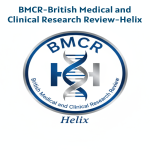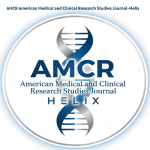Exploring the Journal of Cardiovascular Research Studies: Helix
Introduction to Cardiovascular Research
Cardiovascular research plays a pivotal role in advancing our understanding of heart diseases, stroke, and related conditions that impact millions worldwide. The significance of this field cannot be overstated, as it provides vital insights into the pathophysiology of cardiovascular disorders, which are among the leading causes of mortality and morbidity globally. Research initiatives contribute to the development of effective prevention strategies, diagnostic tools, and treatment modalities, thereby improving overall patient outcomes.
Journals like Helix serve as essential platforms for the dissemination of new findings and advancements in cardiovascular research. They facilitate the sharing of peer-reviewed studies, fostering collaboration among researchers, clinicians, and healthcare professionals. By publishing high-quality research articles, Helix ensures that the latest knowledge reaches key stakeholders in the medical community, thereby influencing clinical practices and policies. This ongoing dialogue promotes the integration of innovative therapies and technologies in everyday healthcare settings, ultimately benefiting patients.
The evolving landscape of cardiovascular research encompasses various disciplines, including molecular biology, genetics, pharmacology, and epidemiology. By examining the multifaceted nature of heart diseases, researchers can identify risk factors and develop targeted interventions. Furthermore, studies focusing on population health contribute essential data to inform public health initiatives aimed at reducing the burden of cardiovascular diseases. This interplay between clinical practice and public health underscores the importance of a multidisciplinary approach to cardiovascular research.
In conclusion, the ongoing exploration of cardiovascular research is vital for the advancement of medical science and the improvement of health outcomes. Journals such as Helix not only support the dissemination of groundbreaking research but also serve as a critical nexus for knowledge exchange that ultimately enhances patient care and guides health policy. As we continue to unveil the complexities of cardiovascular conditions, the collective efforts in research will have a lasting impact on the healthcare community and society at large.
Overview of the Helix Journal
The Helix Journal is an esteemed publication dedicated to the advancement of knowledge within the realm of cardiovascular research. Founded on the principles of scientific integrity, transparency, and excellence, the Helix Journal has positioned itself as a vital resource for scholars, clinicians, and researchers engaged in various aspects of cardiovascular science. Its mission encompasses not only the dissemination of groundbreaking research but also the fostering of collaboration and dialogue among professionals in the field.
Targeting a broad audience, the Helix Journal serves healthcare professionals, researchers, and academics alike, contributing significantly to the development of cardiovascular literature. The journal encompasses an extensive range of topics, including clinical studies, molecular mechanisms, epidemiological investigations, and innovative approaches in the prevention and treatment of cardiovascular diseases. This diversity of focus ensures that the content remains relevant and informative, catering to the evolving trends in cardiovascular research.
The Helix Journal publishes its issues quarterly, presenting a consistent stream of high-quality studies and review articles. Each submission undergoes a rigorous peer-review process, which reinforces the journal's commitment to maintaining exceptional standards. This diligence not only bolsters the credibility of the findings published but also helps authors refine their research methodologies and conclusions, thereby enhancing the overall quality of the cardiovascular literature. By sustaining a transparent and objective peer-review system, the Helix Journal actively contributes to the continuous improvement of cardiovascular research.
In conclusion, the Helix Journal serves as a notable platform for disseminating cardiovascular research, providing a vital link between researchers and practitioners in the field. Its established principles, commitment to rigorous validation, and inclusive nature foster an environment conducive to the advancement of knowledge and practice in cardiovascular health.
Key Research Trends in Cardiovascular Studies
The field of cardiovascular research has witnessed significant advancements in recent years, as highlighted by the current trends published in the Journal of Cardiovascular Research Studies, Helix. One of the most notable areas of focus is the development of innovative treatment options for various cardiovascular diseases. Researchers are increasingly exploring the potential of gene therapy and regenerative medicine in addressing heart conditions that were previously deemed untreatable. These cutting-edge approaches aim to restore or regenerate heart tissue, thereby improving patient outcomes and quality of life.
Another emerging trend is the integration of advanced medical technologies into cardiovascular care. The advent of wearable devices and mobile health applications has enabled continuous monitoring of heart health, allowing for timely interventions and personalized care regimens. The utilization of artificial intelligence in predictive analytics has also revolutionized the analysis of cardiovascular risks, leading to more effective preventive measures and treatment protocols.
Public health initiatives focused on cardiovascular health are gaining momentum as well. There is a growing recognition of the importance of lifestyle modifications and community engagement to reduce the prevalence of cardiovascular diseases. Encouraging healthy diets, promoting physical activity, and implementing smoking cessation programs have become essential components of public health strategies aimed at combating cardiovascular illnesses globally.
Epidemiological studies are another critical element in understanding cardiovascular health trends. Recent research has shed light on the prevalence of cardiovascular conditions across different demographics, thereby highlighting disparities in access to care and outcomes. This has spurred discussions around the importance of equitable healthcare solutions and targeted interventions to address specific population needs.
Overall, the evolution of research focus areas in cardiovascular studies reflects the dynamic nature of the field, driven by scientific innovation and a commitment to improving cardiovascular health outcomes. These trends signify a promising future facing cardiovascular research as it adapts to meet the challenges of the modern healthcare landscape.
Impact and Future Directions of Cardiovascular Research
The Journal of Cardiovascular Research Studies: Helix has made significant contributions to both the medical community and society at large. Research published in Helix has served as a cornerstone for evolving clinical practices, ultimately shaping the way healthcare professionals approach cardiovascular diseases. Numerous studies have highlighted innovative treatment methods, preventative strategies, and the importance of early detection, which translate into improved patient outcomes. As healthcare systems begin to integrate these findings into everyday practice, the dissemination of accurate information becomes vital for enhancing clinical decision-making.
Beyond direct clinical implications, the studies featured in Helix play an essential role in guiding healthcare policy-making. Policymakers are increasingly relying on evidence-based research to craft legislation and establish guidelines that govern public health initiatives. By presenting rigorous data and insights, Helix enables stakeholders to make informed choices regarding resource allocation and prioritization of public health strategies. This is particularly salient in the context of iterative health crises, where timely and accurate cardiovascular research can inform national responses and preventative measures.
Looking ahead, the future of cardiovascular research appears poised for both challenges and opportunities. Emerging technologies such as artificial intelligence and genomics promise to transform our understanding of cardiovascular conditions. These advancements may enable researchers to develop personalized treatment plans that cater to individual patient needs, promoting a more nuanced approach to cardiovascular health. However, challenges such as funding limitations, translating complex research into practical applications, and addressing health disparities remain pertinent. As the landscape of cardiovascular research evolves, collaboration among researchers, clinicians, and policymakers will be essential for harnessing these opportunities while navigating the associated challenges.








